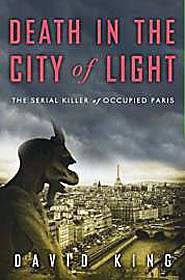Book chronicles serial-killer stalking Nazi-occupied Paris
Published 5:00 am Sunday, October 9, 2011

- Book chronicles serial-killer stalking Nazi-occupied Paris
“Death in the City of Light: The Serial Killer of
Nazi-Occupied Paris” by David King (Crown, 492 pgs., $26)
Trending
As a journalist and a history buff, I’ve always been an admirer of the historical detective work of Erik Larson, and his skill at rendering the most base of human criminal acts against the backdrop of sometimes dazzling human historical achievements.
In “Death in the City of Light: The Serial Killer of Nazi-Occupied Paris,” David King takes that model to an impressive new place.
At its heart, King’s book is a page-turning, detective manhunt/courtroom drama account of the murderous but charming Dr. Marcel Petiot, who was charged with committing 27 murders in Nazi-occupied Paris, who admitted to killing 63 people in the name of the French Resistance.
King’s narrative hooks the reader from the opening page — when police are called to Petiot’s mansion in a fashionable Paris neighborhood to respond to reports of nauseating black smoke, only to discover a grisly landscape of body parts and a backyard pit filled with lime.
What unfolds from there is a furious tale of detective work to piece together what happened in Petiot’s house at 21 rue Le Sueur. King manages to paint the house as a macabre character in its own right, with its lime pit, its triangular death chamber and its smoking, oozing basement stove.
With astounding attention to detail, King weaves together the tortured tale of Petiot’s background and the individual stories of his apparent victims, many of them Jews fearing that they would be sent to Nazi concentration camps. They turn to Dr. Petiot, who claims to run an escape network that will help smuggle them to freedom. For most, the journey goes no further than 21 rue Le Sueur.
Trending
There’s a seven-month manhunt for Petiot, then a trial that would have put even the most modern Casey Anthony-like legal spectacle to shame as a media circus. The case incites such passions that at one point, the judge himself — before the trial has ended — is quoted in the press as calling Petiot “a demon, an unbelievable demon,” “a terrifying monster” and “an appalling murderer.”
The book was sparked when King, while preparing a lecture for a European history class at the University of Kentucky, where he taught before becoming a full-time writer, happened across a wartime memoir that described the Petiot case. From there, King amassed a wealth of original source materials, including previously classified police files, newspaper accounts of the manhunt and trial, and other original documents about Petiot’s case.
“Death in the City of Light” is a fascinating piece of historical nonfiction, and King tells it with the skill of the best police and courthouse beat reporters, mixed with the sweeping eye of a social historian.
All of the book’s action is set against the backdrop of the occupation of Paris — the roundups of French Jews, the everyday terror of living under Nazi occupation, the Allied sweep after D-Day and the exultant liberation of the City of Light. Dr. Petiot’s tale is at times absorbed and complicated by the Nazi horror that suffuses all aspects of life in 1944 Paris.
“A predator had brutally exploited opportunities for gain,” King writes, “slaughtering society’s most vulnerable and desperate people, the majority of them being Jews fleeing persecution. Dr. Petiot had become the self-appointed executioner for Hitler, gassing, butchering, and burning his victims in his own private death camp.”








